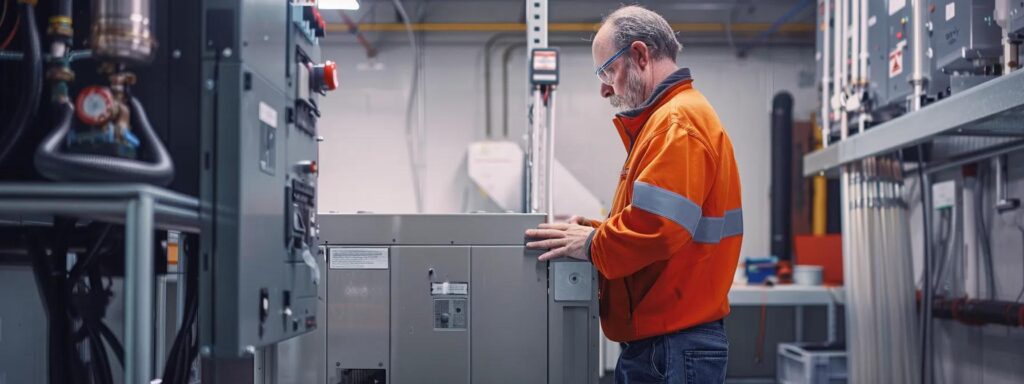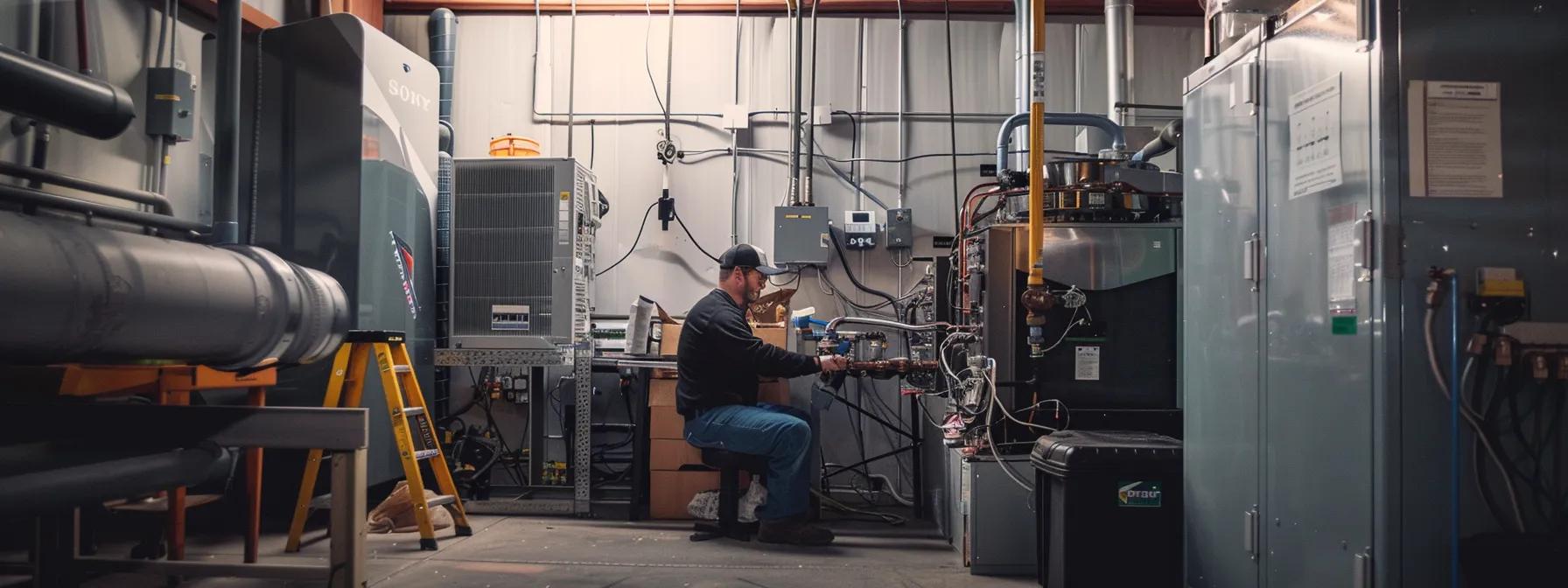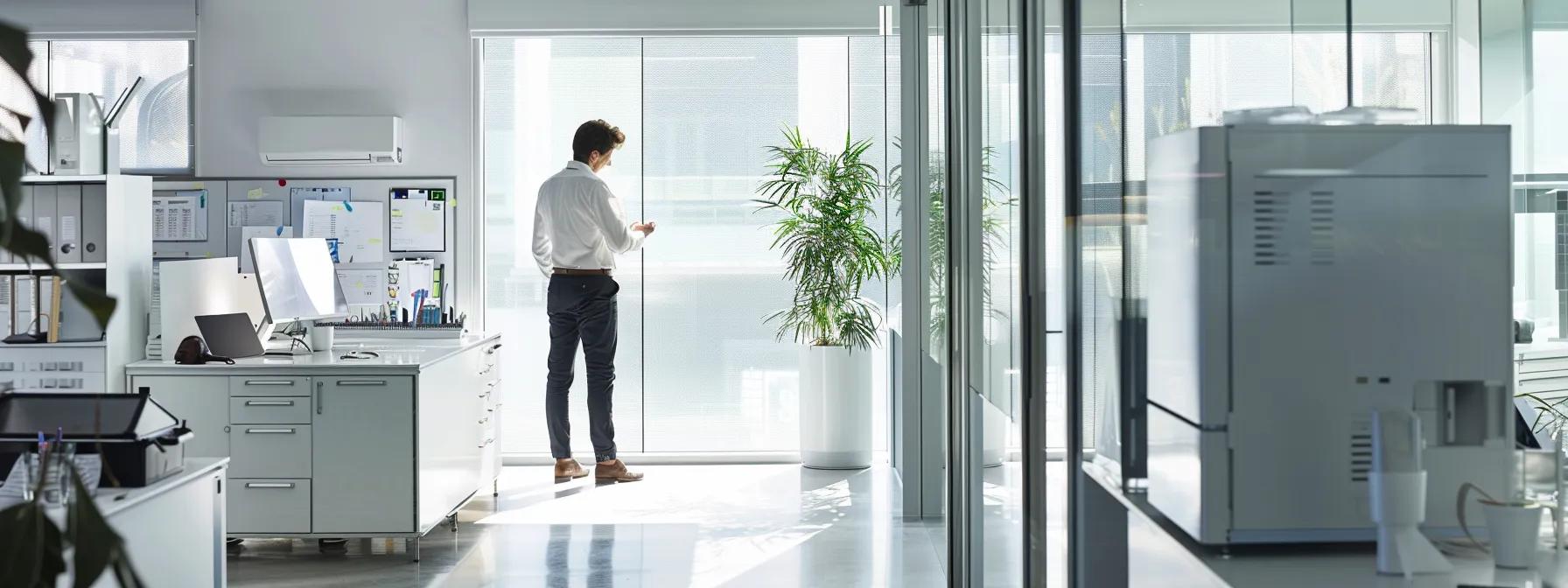Common Furnace Installation Pitfalls in Savannah GA Explained

Identify Common Mistakes in Furnace Installation in Savannah GA
Improper furnace installation can drastically decrease efficiency and increase energy consumption. Homeowners in Savannah GA sometimes attempt DIY installations that risk safety, performance, and system longevity, especially when using heat pumps inappropriately. Understanding these mistakes helps ensure that your furnace operates at peak efficiency while minimizing future failures, so it’s wise to request-estimate from experienced professionals.
Understand the Impact of DIY Installation on Furnace Efficiency
DIY installation may seem cost-effective initially; however, incorrect techniques frequently lower furnace efficiency by as much as 20%. When a furnace is not calibrated correctly or lacks proper sealing, energy is wasted and heating costs rise. Expert technicians, as seen with On Time Air, optimize settings and connections to enhance heat transfer and minimize energy loss.
Recognize Signs of Incorrect Placement of Your Furnace
Improper furnace placement can disrupt air circulation and heat distribution. Signs include uneven room temperatures, frequent cycling, and excessive condensation near the unit. A mislocated furnace hinders proper airflow and increases wear on components. Placing the unit centrally in a low-humidity area is key for maintaining performance.
Assess the Consequences of Improper Ductwork Design
Faulty ductwork design greatly reduces heat delivery. Ducts that are too narrow, leaky, or improperly connected can drop efficiency by 30% or more. Homeowners must ensure that duct sizing and sealing are correct. Regular inspections by a professional HVAC service can help prevent issues such as dust buildup and poor ventilation.
Evaluate the Risks of Inadequate Ventilation During Installation
Inadequate ventilation not only diminishes furnace efficiency but also creates safety hazards. Without proper venting, harmful gases like carbon monoxide can accumulate, posing health risks and legal challenges. It is vital to have appropriately sized venting components, with licensed technicians confirming that exhaust pipes and vent caps meet local safety codes.
Analyze the Importance of Following Local Building Codes
Not following building codes in Savannah GA often results in inspection failures and unsafe working conditions. Building codes specify installation methods, ventilation requirements, and placement guidelines. Ignoring these may lead to fines, voided warranties, or costly modifications. Always review local regulations to ensure compliance and system longevity.
Consider the Cost Implications of Installation Errors
Installation errors can lead to increased repair costs, higher energy bills, or even a complete system replacement. While a DIY approach might seem cheaper on the surface, mistakes may result in significant long-term expenses. Investing in professional installation can be more cost-effective by preventing inefficient operation and future hazards.
Learn About Essential Preparatory Steps for Furnace Installation

Proper preparatory steps before installation ensure that your furnace operates efficiently and safely. Planning ahead reduces delays and cost overruns while confirming that the selected furnace is compatible with your home environment.
Create a Checklist for Necessary Tools and Materials
A comprehensive checklist is essential for a successful installation. This list should include digital thermometers, proper wrenches, duct tape, sealing compounds, appropriate piping, gas leak detectors, and electrical testing equipment. Having all the necessary tools on hand reduces time wastage and minimizes errors during installation.
Inspect Your Home for Compatibility With New Furnace Models
Before installation, verify that your home’s infrastructure supports the new furnace. Review factors such as home size, insulation quality, ventilation, and electrical supply. Homes with inadequate insulation may lose up to 35% of produced heat, reducing performance. Professional HVAC technicians can perform compatibility checks and advise on the proper furnace capacity and placement.
Determine the Best Location for Optimal Heat Distribution
Choosing the optimal location is critical for even heat distribution. A central placement that avoids obstructions and minimizes duct lengths is ideal. A poorly chosen location may cause temperature imbalances and inefficient airflow. Consider proximity to living areas, noise factors, and ease of maintenance when selecting the furnace location.
Assess Your Home’s Insulation and Sealing Requirements
Good insulation and proper sealing significantly boost furnace performance by reducing heat loss. Leaky windows and poorly insulated walls can lower heating efficiency by up to 25%. Before installation, assess insulation levels, weatherstripping, and seal gaps to protect your investment and support the system’s performance.
Schedule Evaluations With Licensed Professionals for Accuracy
A pre-installation evaluation by licensed HVAC professionals can identify potential pitfalls early. These evaluations typically include taking detailed measurements, assessing airflow, and performing load calculations. Such checks help avoid costly mistakes and ensure the furnace is appropriately matched to your home’s heating needs.
Research Local Regulations Specific to Furnace Installation
Savannah GA has several local regulations concerning HVAC installations. Researching local building codes is critical to ensure compliance. Regulations may cover fuel type requirements, ductwork standards, and venting specifics. Adhering to these rules is essential for both safety and the long-term efficiency of the system.
Explore Professional Installation Benefits Over DIY Approaches
Professional furnace installation by certified HVAC technicians ensures optimal performance, safety, and cost efficiency. Relying on experts can protect you from long-term risks and installation headaches.
Examine the Qualifications of Licensed HVAC Technicians
Licensed HVAC technicians undergo rigorous training and certification, equipping them to handle detailed furnace installations. Their expertise helps prevent common issues like misalignment or poor electrical connections. With experience from firms such as On Time Air, they ensure technical standards and local regulations are met.
Understand Warranty Protections Associated With Professional Work
Professional installations often include warranties that cover labor and parts. Most furnace models require professional installation to maintain manufacturer warranties. This added protection helps safeguard your investment against premature failures and unforeseen expenses.
Discover How Professionals Ensure Compliance With Safety Standards
Certified technicians follow strict industry safety standards during installation. They ensure proper venting, secure electrical connections, and correct gas line fittings to prevent hazards like carbon monoxide poisoning or electrical fires. Their adherence to safety standards protects your home and complies with local regulations.
Investigate the Time and Cost Efficiencies of Hiring Experts
Although professional services might cost more upfront, they offer long-term savings by reducing installation mistakes and expensive repairs. Many professionals provide packages that include pre-installation evaluations, compliance checks, and post-installation support, which helps lower energy costs and ensures reliable operation.
Consider the Long-Term Savings of a Correctly Installed Furnace
A properly installed furnace improves overall efficiency and extends component lifespan. Benefits include lower utility bills, reduced repair costs, and a more reliable heating system. An efficiently installed furnace can save up to 30% on energy costs, making professional installation a wise long-term investment.
Review Customer Testimonials Highlighting Professional Services
Customer testimonials provide evidence of the benefits of professional installation. Homeowners report improved energy efficiency, consistent indoor temperatures, and fewer service disruptions when professionals handle the installation. Positive reviews emphasize the technical expertise and trustworthiness of companies like On Time Air.
Investigate Safety Concerns Related to Furnace Installation

Safety is paramount during furnace installation to prevent hazards and ensure reliable, long-term operation. Prioritizing safety during installation helps mitigate risks associated with construction errors.
Identify Potential Hazards From Improper Gas Line Connections
Faulty gas line connections can lead to leaks and explosion risks. Incorrect fittings, inadequate sealants, or untightened components are common issues. Professional technicians use precise tools and leak detection methods to ensure all gas connections are secure, reducing the risk of dangerous fuel leaks.
Learn About Electrical Safety During Furnace Setup
The wiring and electrical components used in furnace installations must adhere to strict safety codes. Poor wiring can cause short circuits, system malfunctions, or even fires. Technicians follow established electrical standards, ensuring that connections are secure and properly insulated to minimize risks.
Evaluate the Importance of Proper Venting for Your Model
Proper venting removes harmful exhaust gases from your home. Incorrect venting may cause backdrafts that lead to a build-up of carbon monoxide and other toxins. Following manufacturer guidelines and local codes for vent dimensions and placement guarantees safe expulsion of combustion by-products. Safety inspections help ensure that venting systems operate without obstructions.
Understand Carbon Monoxide Risks and Safety Measures
Unvented furnaces or blocked vents can result in dangerous carbon monoxide buildup. Even low levels may cause headaches, dizziness, or more serious health effects. Professional installations include carbon monoxide detectors and strict adherence to venting guidelines to reduce these risks. Regular maintenance is also vital to monitor and control carbon monoxide levels.
Ensure Compliance With Safety Regulations in Savannah GA
Local safety regulations in Savannah GA govern the installation and operation of furnace systems. These codes are in place to protect homeowners from hazards like gas leaks, electrical issues, and improper venting. Compliance is ensured through municipal inspections and adherence to updated building codes, and professionals are well-versed in maintaining these standards.
Discuss How to Handle Propane and Fuel Oil Safely
Handling propane and fuel oil requires extra care during installation to prevent spills, leaks, or accidental ignitions. Proper storage, secure connections, and regular leak inspections are mandatory when these fuels are used. Certified technicians employ specialized equipment and follow industry best practices to safely integrate these systems, ensuring efficient operation and peace of mind.
Examine Seasonal Timing for Furnace Installations in Savannah GA
Seasonal timing can significantly impact furnace installation efficiency and cost. Understanding the advantages and challenges of off-peak versus peak seasons can help homeowners decide the best time to install a furnace.
Analyze the Advantages of Scheduling in Off-Peak Seasons
Installing a furnace during the off-peak season offers benefits such as lower labor costs and reduced scheduling delays. During cooler months, HVAC professionals in Savannah GA typically have lighter workloads, allowing for more focused installation work. Off-peak scheduling may also come with seasonal promotions that further reduce overall costs.
Determine When to Replace Your Old Furnace for Maximum Benefit
Replacing an old furnace before it completely fails can prevent emergencies and ensure continuous heating. Signs that a replacement is needed include increased energy bills, frequent repairs, and uneven heating. Replacing a furnace during transitional seasons allows homeowners to benefit from improved efficiency and enhanced safety features available in modern models.
Consider the Impact of Seasonal Weather on Installation
Weather conditions, including high humidity or extreme temperatures, can affect installation timelines and material durability. In Savannah GA, scheduling installation during mild weather can reduce complications related to corrosion or moisture issues in ductwork. Choosing a season with favorable weather helps ensure that the installation process is smooth and the system performs optimally from the start.
Review the Timeframe for Obtaining Permits in Peak Seasons
During high-demand periods, obtaining the necessary permits for furnace installation may take longer. Homeowners should plan ahead, as permit processing times can extend the overall schedule and delay system activation. Applying for permits in advance helps ensure that the installation is completed in a timely manner.
Prepare for Potential Delays From High Demand Periods
High demand in peak seasons, especially in winter, often leads to longer wait times for installation services. Delays during these periods can disrupt indoor comfort when heating is most needed. Planning ahead and accounting for seasonal contractor availability can help minimize these delays and keep your installation on track.
Assess Pricing Trends Related to Seasonal Installation Timing
Furnace installation prices often fluctuate with seasonal demand. During peak seasons, costs may rise due to increased labor and material expenses, while off-peak seasons might offer discounts and promotions. Being aware of these pricing trends allows homeowners to negotiate better contracts and potentially save on installation expenses while ensuring high system performance.
Understand Maintenance Needs After Furnace Installation

Once your furnace is installed, consistent maintenance is crucial for ensuring optimal performance and longevity. Regular upkeep minimizes breakdowns, sustains energy efficiency, and lowers the risk of costly repairs over time.
Create a Regular Maintenance Schedule for Optimal Performance
A scheduled maintenance program helps keep your furnace operating efficiently. This program should include periodic inspections, filter replacements, and duct cleaning. Regular maintenance can boost furnace efficiency by up to 15% and extend its overall lifespan. Professionals generally recommend at least one annual checkup to catch issues early.
Identify Essential Tasks for Furnace Upkeep Throughout the Year
Key upkeep tasks include replacing air filters, cleaning burner assemblies, and inspecting ductwork for leaks. An annual professional maintenance visit can identify minor issues before they become serious. Ensuring that safety features, such as carbon monoxide detectors, are serviced further enhances indoor air quality and reduces energy costs.
Learn the Signs Indicating Necessary Repairs or Servicing
Recognizing early warning signs of furnace problems—such as unusual noises, fluctuating heat output, or unexpected increases in energy bills—allows for timely repairs. Early intervention by a professional HVAC technician can prevent complete system failures and avoid expensive emergency repairs.
Evaluate the Importance of Professional Maintenance Checkups
Professional maintenance ensures that each component of your furnace functions as designed. These checkups involve thorough inspections, cleaning internal parts, and recalibrating controls for maximum efficiency. In many cases, annual service by certified technicians is required to maintain warranty coverage and safeguard your investment.
Discuss How Maintenance Affects Longevity and Efficiency
Routine maintenance directly contributes to a longer, more efficient furnace lifespan. A neglected furnace may suffer from excessive wear and tear, reducing performance and resulting in premature failure. Conversely, a well-maintained system can operate effectively for over 20 years, minimizing energy waste and maintaining indoor comfort.
Consider How User Habits Influence Furnace Care and Operation
User practices, including thermostat settings and filter replacement frequency, greatly impact furnace performance. Overuse or setting temperatures excessively high can strain the system, while regular maintenance and moderate settings promote efficiency. Educating homeowners on proper usage strategies is key to reducing unforeseen repair costs and extending system life.
Frequently Asked Questions
Q: What are common DIY installation mistakes that affect furnace efficiency? A: Common mistakes include improper placement, faulty ductwork design, and inadequate venting. These issues reduce efficiency and can increase long-term operational costs.
Q: Why is it important to follow local building codes during furnace installation? A: Building codes set strict guidelines for safety, legal compliance, and optimal performance, ensuring proper installation practices and materials usage.
Q: How do professional HVAC technicians enhance furnace installation outcomes? A: Professionals bring years of experience, proper tools, and a deep understanding of safety and compliance standards, all of which improve efficiency and system reliability.
Q: What maintenance tasks are critical for protecting a furnace investment? A: Regular filter changes, annual inspections, grease cleaning, and prompt repairs are essential to maintain efficiency and prolong the lifespan of your furnace.
Q: How can seasonal timing affect furnace installation projects? A: Installing during off-peak seasons can lower costs and reduce delays, while peak seasons might lead to longer wait times and increased prices.
Q: What are the risks of not scheduling regular maintenance for your furnace? A: Skipping maintenance can result in reduced efficiency, higher energy bills, frequent breakdowns, and safety hazards like gas leaks or carbon monoxide buildup.
Final Thoughts
The proper installation and maintenance of a furnace in Savannah GA are essential for achieving efficient, safe, and cost-effective heating throughout your home. Avoiding common errors—whether due to DIY mistakes, improper ductwork, or neglecting building codes—protects both your investment and your household’s safety. Professional installations offer superior benefits through expert knowledge, warranty protections, and adherence to stringent safety standards. Regular maintenance and proper usage practices help ensure peak performance, reduce energy waste, and lower long-term operational costs.